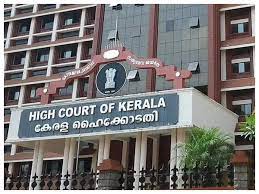 The Kerala High Court in the case of NIKHIL AYYAPPAN VERSUS STATE OF KERALA, ENFORCEMENT OFFICER, JOINT COMMISSIONER (APPEALS), KERALA STATE GOODS AND SERVICES TAX DEPARTMENT, GOODS AND SERVICE TAX vide WP (C) NO. 19789 OF 2025 dated 05.06.2025, reinforces that redemption of confiscated goods is permissible beyond the initial time period, as long as goods are not sold and State interest is protected. It also upholds the principle that interim relief may be granted by writ courts even when statutory remedies are availed, to prevent irreparable harm pending appeal. The Court held that goods confiscated under Section 130 of the CGST Act can still be released during the pendency of an appeal, provided they have not been auctioned yet.
The Kerala High Court in the case of NIKHIL AYYAPPAN VERSUS STATE OF KERALA, ENFORCEMENT OFFICER, JOINT COMMISSIONER (APPEALS), KERALA STATE GOODS AND SERVICES TAX DEPARTMENT, GOODS AND SERVICE TAX vide WP (C) NO. 19789 OF 2025 dated 05.06.2025, reinforces that redemption of confiscated goods is permissible beyond the initial time period, as long as goods are not sold and State interest is protected. It also upholds the principle that interim relief may be granted by writ courts even when statutory remedies are availed, to prevent irreparable harm pending appeal. The Court held that goods confiscated under Section 130 of the CGST Act can still be released during the pendency of an appeal, provided they have not been auctioned yet.
Facts of the Case:
The petitioner a registered taxpayer under the CGST and KSGST Acts, was engaged in the transportation of scrap materials using a vehicle. On 09.10.2024, the said vehicle was intercepted. Upon inspection, certain irregularities were detected, leading to initiation of confiscation proceedings under Section 130 of the CGST Act.
These proceedings culminated in the passing of confiscation order, whereby Fine in lieu of confiscation was imposed. The goods were ordered to be released if the fine and penalty were paid within three months.
The petitioner preferred an appeal against the confiscation order and produced acknowledgment as proof of filing. Meanwhile, the petitioner received a notice threatening auction of the vehicle, unless a stay order was produced.
Hence, the petitioner approached the Court seeking quashing notice and a direction to release the vehicle and goods unconditionally or upon payment of fine.
The department contended that Section 130 does not provide for release of goods except under sub-sections (2) and (7), and the three-month period specified in sub-section (7) had already lapsed.
Issue:
Whether the goods already confiscated under Section 130 of the GST Act can be released during the pendency of appeal, even after expiry of the 3-month payment period stipulated in the confiscation order.
Held that: The Hon’ble High Court observed that Section 130(2) and 130(7) of the CGST Act do not prohibit release of confiscated goods upon payment of fine in lieu of confiscation, even if the three-month period has expired, provided the goods have not been sold. The Court noted that although the period granted in the confiscation order to redeem the goods had lapsed, the goods had not been auctioned yet. Therefore, no prejudice would be caused to the Revenue if the petitioner is allowed to pay the fine and secure release of goods.
Citing equity and fairness, the Court held that as long as the goods have not been sold, the taxpayer should be granted another opportunity to pay the fine in lieu of confiscation and secure release. The Court held that ” As the goods are not reportedly sold, there are no reasons to deny the opportunity to the petitioner to avail the option of getting the goods released, by making the payment of fine in lieu of the confiscation…”
The Court disposed of the writ petition with the direction that the respondent shall release the confiscated goods upon the petitioner making the payment of the fine in lieu of confiscation as stated in the confiscation order, within one month. Upon such payment, the goods shall be released immediately.
To read the complete judgment 2025 Taxo.online 1124


